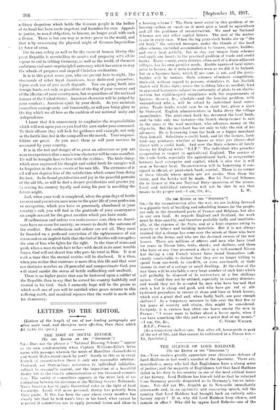LETTERS TO THE EDITOR.
(Letters of the length of one of our leading paragraphs are often more read, and therefore more effective, than those which Ad ;noble the space.]
THE ROOT OF SOCIAL REFORM'.
[To THE EDITOR or THE "SPtreATnR.") SIR,—Does not the phrase a " National Housing Scheme " appear as its own condemnation when Captain WillianineEllis's letter opens with passages uherein the needs of Hamilton (Lanarkshire) and Smith Wales stand cheek by joss'? Surely in this as in every branch of reconstruction there is only one reasonable solution: Slate-aid, net State-action; assistance to individual initiative, subject to reasonable control, not the imposition of a beautiful theory left to the chaotic administration of ten thousand commit- tees. The vanity of committees appears in the utter lack of co- rdination between the decisions of the Military Service Tribunals. Their function was to apply thecrelical rides in the light of local enoeledge. Lecal, still more personal, theory has patently been their guide. If this has been the case where every member has clearly felt that he held men's lives in his band, what cannot be espected if committees are to ninety personal tastes and ideas to a housing scheme ? The State most assist in this problem of re- housing—urban or rural—as it must give a hand to agriculture and all the problems of reconstruction. We need no National Schemes nor any other capital letters. The root of the matter is one in every case. When the big joint-stock banks ate up " the o!d bank," the salaried manager, under the thumb of the bend office scheme, curtailed accommodation to furnace, squire, builder, and every local activity. Let us stay our tongue from schemes and apply our hearts to the practical problem of trade and credit banks. Every county, every district, often each of a dozen adjacent villages, lots its own peculiar needs. Ennoble approved local enter- prise to borrow, do it unto ourselves even as ova did it to Ireland, but on a business basis. which 21 per cent. is trot, and the jerry- builder will be undone. State schemes eliminate competition. State-aid, without regard to persons, stimulates it. Let Norfolk thatch and Wales slate; revise the building laws as needful; lend to approved borrowers subject to conformity of plans to an elastic- in-form but rigid-in-spirit compliance with the requirements of hygiene, decency, ac., schedule—and the housing problem, with unnumbered others, will be solved by individual local enter- prise. Trade banks would soap be on their feet, given a start by State-aid. English administrators in India decry the village moneylender. The joint-stock bank has devoured the local bank, and—to take only one instance—the Scotch sheep-farmer is safe in the moms of the moot merchant, who advances money on the clip-to be. Bat the merchant has not only to take the risk of his advances. He is borrowing from the bank or a bigger merchant titans himself. Substitute a credit bank, and let the farmer, land- lord—any producer, whether of houses or what you please—deal direct with a credit bank. And over the State schemes of lovely theory let England write "R.I.P." The individual who preaches co-operation is suspect in agricultural England. The essence of the trade bank, especially the agricultural bank, is co-operation between local enterprise and capital, which is also (for it will WWI so become) local. Reconstruction will be hamstrung if con- signed to official, or joint-stock bank, control. There is no corner of the-e islands where minds are not awake. Give them the straw, and the bricks will be made. But let National Schemes, die in favour of the one National Duty—provision of tine means. Local and individual enterprise will not be slow to use that
means to its proper end.—I am, Sir, &e., L. W.


























 Previous page
Previous page